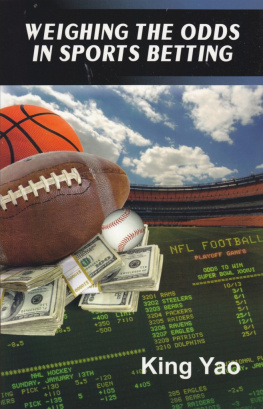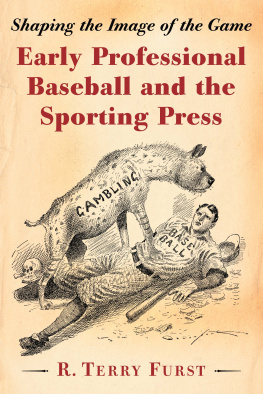Stumbling On Wins
Two Economists Expose the Pitfalls on the Road to Victory in Professional Sports
David J. Berri
Martin B. Schmidt
Vice President, Publisher: Tim Moore
Associate Publisher and Director of Marketing: Amy Neidlinger
Acquisitions Editor: Kirk Jensen
Editorial Assistant: Pamela Boland
Development Editor: Russ Hall
Operations Manager: Gina Kanouse
Senior Marketing Manager: Julie Phifer
Publicity Manager: Laura Czaja
Assistant Marketing Manager: Megan Colvin
Cover Designer: Joy Panos Stauber
Managing Editor: Kristy Hart
Project Editor: Anne Goebel
Copy Editor: Geneil Breeze
Proofreader: Sheri Cain
Indexer: Erika Millen
Compositor: Nonie Ratcliff
Manufacturing Buyer: Dan Uhrig
2010 David J. Berri and Martin B. Schmidt
FT Press offers excellent discounts on this book when ordered in quantity for bulk purchases or special sales. For more information, please contact U.S. Corporate and Government Sales, 1-800-382-3419, .
Company and product names mentioned herein are the trademarks or registered trademarks of their respective owners.
All rights reserved. No part of this book may be reproduced, in any form or by any means, without permission in writing from the publisher.
Printed in the United States of America
Second Printing May 2010
ISBN-10: 0-13-235778-X
ISBN-13: 978-0-13-235778-4
Pearson Education LTD.
Pearson Education Australia PTY, Limited.
Pearson Education Singapore, Pte. Ltd.
Pearson Education North Asia, Ltd.
Pearson Education Canada, Ltd.
Pearson Educacin de Mexico, S.A. de C.V.
Pearson EducationJapan
Pearson Education Malaysia, Pte. Ltd.
Library of Congress Cataloging-in-Publication Data
Berri, David J.
Stumbling on wins : two economists expose the pitfalls on the road to victory in professional
sports / David J. Berri, Martin B. Schmidt.
p. cm.
ISBN 978-0-13-235778-4 (hardback : alk. paper) 1. Professional sportsEconomic
aspectsUnited States. 2. Professional sportsSocial aspectsUnited States. I. Schmidt,
Martin B. II. Title.
GV716.B466 2010
338.477960973dc22
2009040397
To Lynn and Susan:
We couldnt have done this without you.
Contents
Acknowledgments
The stories we present are drawn both from our research, and the research of others. Obviously, we are indebted to the authors of all the studies we cite. Our own research, though, is not simply the product of our efforts. Specifically we are indebted to the following list of coauthors: Stacey Brook, J.C. Bradbury, Aju Fenn, Rod Fort, Brad Humphreys, Anthony Krautmann, Young Hoon Lee, Michael Leeds, Eva Marikova Leeds, Michael Mondello, Joe Price, Rob Simmons, Brian Soebbing, and Peter von Allmen. We would also like to thank all of the economists who have participated in sessions on sports economics at the Western Economic Association and with the North American Association of Sports Economists. These sessions have been a tremendous help in our work.
We also wish to thank Stefan Szymanski, who urged us to focus on these stories for our next book; and Dean Oliver, who once again provided invaluable insights and assistance for our study of basketball statistics.
Several people read early drafts of chapters and made many valuable suggestions. This list includes J. C. Bradbury, Owen Breck, Stacey Brook, Juliane Clapp, Rich Campbell, Jason Eshleman, Jim Peach, Kevin Quinn, Raymond Sauer, and Stephen Walters. Special thanks go out to Leslee Watson-Flores and Fred Flores, who took the time to read and offer valuable comments on every single chapter.
The Wages of Wins Journala blog we started at the suggestion of J. C. Bradburyhas proven to be an invaluable resource. Our audience consistently provides insightful comments into the stories we try and tell.
The people of FT Press, specifically Martha Cooley, Kirk Jensen, Russ Hall, Anne Goebel, and Tim Moore have all been extremely patient and helpful. This book would not have been possible without Martha, so she certainly deserves a great deal of credit. And Kirks editorial assistance was essential in transforming our ideas into this final product.
Finally, the list of people we have to thank includes our families, whose support is very much appreciated. Dave Berri would like to thank his wife, Lynn, as well as his daughters, Allyson and Jessica. Lynn read each and every chapter of this book, and her suggestions went far to overcome the limitations in our writing abilities. Martin Schmidt would also like to thank his wife, Susan, as well as his children, Michael, Casey, and Daniel.
About the Authors
David J. Berri is an associate professor of economics at Southern Utah University. He is coauthor of The Wages of Wins (Stanford Press). Additionally, he has authored or coauthored more than 30 academic papers, most in the area of sports and economics. His nonacademic writing has appeared in The New York Times, VIBE Magazine, and online at The Wages of Wins Journal (dberri.wordpress.com). In 2009, he was elected president of the North American Association of Sports Economists and is currently serving on the editorial board of both the Journal of Sports Economics and the International Journal of Sport Finance. He lives with his wife (Lynn) and two daughters (Allyson and Jessica) in Cedar City, Utah.
Martin B. Schmidt is a professor of economics at the College of William and Mary. He is coauthor of The Wages of Wins and also the author of nearly 40 articles primarily in the areas of monetary economics and sports economics. In addition, his writing has appeared in The New York Times and The Sports Business Journal. He lives with his wife and three kids in Williamsburg, Virginia.
Preface
Once upon a time, the word moneyball was only heard in reference to a winning shot in billiards. A few years ago, though, the phrase moved out of the pool hall and onto the baseball diamond. The man responsible for this move was Michael Lewis. In 2003, Lewis published Moneyball, a book that tells the remarkable story of the Oakland As and General Manager Billy Beane. From 1996 to 2006, Beane managed to consistently field a winning baseball team without spending very much money on players. According to Lewis, this feat was accomplished because Beane knew something about measuring player performance that other decision-makers in baseball didnt know.
One year before Moneyball appeared, we published an article examining the coaches voting for the All-Rookie team in the National Basketball Association (NBA). This article suggested that coaches in the NBA were not evaluating rookies correctly. Then in 2006 we published, along with Stacey Brook, The Wages of Wins. Our first book explored a variety of issues in sports and economics, including labor strikes, competitive balance, and the ability of a player to turn it on in the playoffs. Within this list, we presented evidence that decision-makers in the NBAlike their counterparts in baseballhad problems measuring the value of free agents.
The idea that people in baseball and basketball have trouble evaluating players is certainly interesting to sports fans. Such stories, though, have implications beyond sports. In recent years, research has shown that, in general, people have trouble making good decisions. For example, Daniel Gilberts Stumbling on Happiness, a book that inspired our own title, showed how peoples efforts to find happiness are often sabotaged by their own actions. Dan Ariely, in Predictably Irrational, presented a number of experiments that show the difficulty people have in evaluating new information and making good decisions. And Richard Thaler and Cass Sunsteinin









